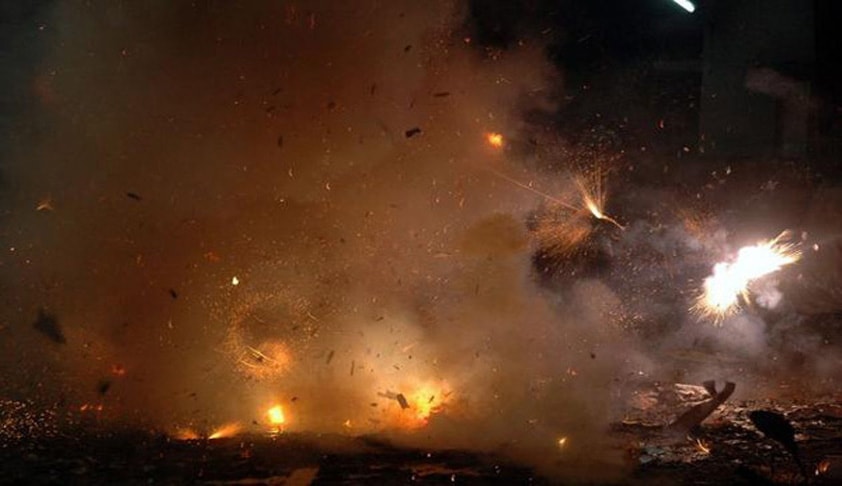My Right To Existence - The Sordid Saga Of Future Generations Through A Child
Prof. Arvind Jasrotia
6 Dec 2016 12:27 PM IST

The Supreme Court passed a significant order last weekend responding to a plea by three infants for the ban on the sale of firecrackers in NCR, Delhi. The Court through Chief Justice TS Thakur reiterated: “Keeping the grave air quality in mind, we can intervene to suspend the license”. The petition, citing WHO reports, stated that Delhi has retained the unique distinction of being the most polluted city in the world. Levels of particulate matter are highest and across the country, over 7 lakh deaths occur annually due to air pollution-related diseases and that citizens of India have 30 per cent lower lung capacity than Europeans. The children are worst affected, as their lungs are not fully developed, making their systems more vulnerable.
The Air in several places in the country becomes laden with toxic matters generally, and around Diwali, in particular. Another equally chilling investigation titled ‘Death by Breath’, covered by Express Investigation also conclusively pointed towards an air pollution catastrophe with existential threats. The study claimed that the lung function has deteriorated so much that now 9-10 years old have lungs of chronic smokers and the expectation of 80 percent lung function deteriorate to 60 percent and it is unlikely that the deficit in our lung functioning at the age of 17 years will be reversed. In other words, 40 lakh school children in Delhi will attain adulthood with irreversible lung limits.
The said petition filed by the infants lamented that while considerable debate and long-term measures are being discussed by ‘slow moving state machinery for implementation of measures to control pollution levels in Delhi’, the highest court of the land was ‘duty bound’ to take interim steps in effectuating the people’s right to clean, healthy and breathable air under Article 21 of the Constitution. The children are the most vulnerable category when it comes to air pollution, especially from suspended particles and toxins and are foremost prone to lung disease, asthma, coughing, bronchitis, retarded development of the nervous system and cognitive impairment. On Friday, 2nd of December, the Apex Court approved the Centre’s graded response action plan to tackle varied levels of pollution by segregating air quality into four categories — moderate to poor, very poor, severe and emergency and prescribing specific actions for each situation.
What is most remarkable is the sensitivity with which the Supreme Court acted on the petition filed on behalf of infants as their right to future existence is at stake. A child’s existence gets threatened through a state and society’s behaviour that has been inhumane, callous and irresponsible motivated by an attitude of rampant consumerism and unsustainable patterns of production and consumption. His capability for functioning and choice has been severely restricted and his life being so reduced as to be not worth living. Thus, there is recognition of the intergenerational nature of the air pollution effects that have a long life span with considerable influence on the quality of life decades later. Thus there are obligations that we owe to future generations.
Air Pollution is one of the greatest challenges of our generation with consequences that transform life on earth and adversely impact the livelihood of millions of people. It poses great risks and threats to environment and human health including social and economic development. These impacts interfere with the effective enjoyment of human rights. Thus, thinking about air pollution from a human rights perspective is a fundamental necessity in terms of guiding our policy and legal framework as the interests harmed by air pollution are basic and provide substantive basis for holding State responsible for the toxic impacts. In failing to tackle air pollution threats with urgency, State is effectively violating the human rights of millions of country’s people. This makes State vicariously liable for its negligence, callous attitude and omission to tackle air pollution threats as well as in furthering a conspiracy to suppress the awareness of the linkages between air pollution and health of the child and depriving the parents of this vital information as various diligent studies in the ongoing investigation substantiate?
The case also raises interesting jurisprudential parallels. The sheer planetary scale and ambit of atmosphere makes it a ‘public good’ prone to overexploitation and under-regulation. Way back in 1968, Garrett Hardin in his classical work, The Tragedy of the Commons dealt with the general problem of utilizing resources that are public and common property. He argued that if no plan for the utilization of such resources is accepted by all involved, the common will not be optimally utilized and will give lower return than investment in own property. The reason is the lack of care that the common deserves vis-à-vis private property. Investment in own property will give full return for oneself. That would also be the case with investment in the common if everybody involved contributed on equal terms. However, some will suspect other owners for failing to do their part, be ‘free-riders’, and may therefore end up as ‘free-riders’ themselves. Expanding the definition of the commons, Hardin explains:
“In a reverse way, the tragedy of the commons reappears in problems of pollution. Here it is not a question of taking something out of the commons, but of putting something in -- sewage, or chemical, radioactive, and heat wastes into water; noxious and dangerous fumes into the air. The rational man finds that his share of the cost of the wastes he discharges into the commons is less than the cost of purifying his wastes before releasing them. Since this is true for everyone, we are locked into a system of ‘fouling our own nest,’ so long as we behave only as independent, rational, free enterprisers”.
In 1972, Christopher Stone wrote an influential legal article Should Trees Have Standing--Toward Legal Rights for Natural Objects. The article was inspired by a case in which the Sierra Club, as a body with a general concern for wilderness conservation, challenged the development of Mineral King Valley on the grounds that the valley should be kept in its original state for its own sake. Stone reasoned that if trees, forests and mountains could be given standing in law then they could be represented in their own right in the courts by groups such as the Sierra Club. Moreover, like any other legal person, these natural things could become beneficiaries of compensation if it could be shown that they had suffered compensable injury through human activity. Stone’s arguments were echoed in the dissenting judgment that endorsed his proposal to give legal standing to natural things which would allow conservation interests, community needs and business interests to be represented, debated and settled in court. Similarly, when a campaign was launched in Lapland to protect a river against so-called development, the slogan “Let the river live!” did not concern the H2O of the river, but a somewhat vaguely conceived ecosystem as a whole - a living whole including people who did not interfere, who lived along the river and used it in an ecologically responsible, sustainable way. This raises possibility of filing cases on behalf of our national rivers like Ganga to tackle the issue of water pollution.
Thus unless air pollution, an externality, is seen as a moral, ethical and legal concern, any action will be half baked. The ‘Directive Principles of State Policy’ and the ‘Fundamental Duties’ expressly enunciate the national commitment to protect and improve the environment and puts State under an affirmative obligation under Article 48-A of the Constitution ‘to protect and improve the environment and to safeguard the forests and wild life of the country’? Isn’t this sheer callousness on the part of the State to fritter away the judicial gains in number of cases where the courts acting amicus environment tread the path of processual justice without enslaving herself to procedural compulsions resulting in strengthening the constitutional mandate of the right to a wholesome environment as reiterated in a case “… (T)here can be no reason as to why the practice of violent extinguishment of life alone would be regarded as violative of Article 21 of the Constitution. The slow poisoning by the polluted atmosphere caused by environmental pollution and spoliation should also be regarded as amounting to violation of Article 21 of the Constitution…”?
It is the collective duty of the State through Articles 39(e), 47 and 48-A of the Constitution to secure the health of the people, improve public health and protect and improve the environment with sustainable development as a balancing concept through appropriate administrative action? Equally it is the fundamental duty of our fellow countrymen through Article 51-A (g) ‘to protect and improve the natural environment including forests, lakes, rivers and wild life and to have compassion for living creatures’. We should be prudent in the use of goods that include emission as driving a car or burning fire crackers or putting fire to wheat husks are just few of the carbon emitting activities that millions of individuals undertake daily with combined impact causing great harm to our life? One of the important ways in which Sate and society can bring forth change is through eternal vigilance and robust dialogue in which constituents’ voices are actually heard and incorporated into policy perspectives regarding all those vital issues that touch daily aspect of our lives. It is the responsibility of the State and society alike to take prudential measures in order to prevent humanity from fouling her own nest and ensure a safe habitat.
 Arvind Jasrotia is a Professor of Law and presently, Head and Dean, Faculty of Law, University of Jammu.
Arvind Jasrotia is a Professor of Law and presently, Head and Dean, Faculty of Law, University of Jammu.
[The opinions expressed in this article are the personal opinions of the author. The facts and opinions appearing in the article do not reflect the views of LiveLaw and LiveLaw does not assume any responsibility or liability for the same]
This article has been made possible because of financial support from Independent and Public-Spirited Media Foundation.


